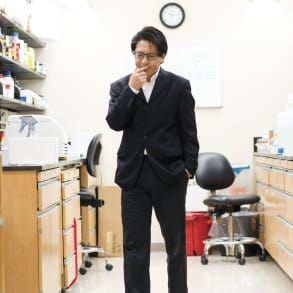With the entry of immune checkpoint inhibitors such as anti-PD1 and anti-CTLA-4 into the clinic, excitement about immune-based therapies for cancer has been growing. Three immunologists at the Medical University of South Carolina (MUSC)—Zihai Li, M.D., Ph.D., Shikhar Mehrotra, Ph.D., and Chrystal Paulos, Ph.D.—discuss the promise of immune-based therapies such as immune checkpoint blockade and adoptive cell transfer and how the researchers and clinicians at MUSC are helping advance the field.
More at Progressnotes, MUSC’s Medical Magazine
ZIHAI LI: There was a debate about whether immune system care about cancer. But I think recent developments in the field have answered this question loud and clear. And that is cancer develops partly because of failure of the immune system. So as a result, there's a tremendous excitement and promise that focusing on rejuvenating the immune system will be one day the curable strategy for eradicating cancer. CHRYSTAL PAULOS: When I started training in cancer immunotherapy, I had to walk down this long hallway of patients that were getting treated with adoptive immunotherapy. And Steven Rosenberg would update us on what's going on with these patients, which was invigorating because back then, long ago, we would see large tumors regress and never come back. So it's not just now. It's been an exciting thing that, I feel, finally, people are paying attention to. SHIKHAR MEHROTRA: Here, what you're talking about is a person's own immune cells, which can be either engineered or redirected to control the tumors much better. And that is something which is very exciting. And a bunch of small number of cells have got the power to go and find the tumor and kill it. CHRYSTAL PAULOS: Immune checkpoint blockade has been an exciting game changer in cancer immunotherapy. As you can imagine, you've probably seen headline news on how exciting it is. So I'll be more specific. PD-1 blockade therapies, as well as CTLA-4 blockade therapies have unleashed the t-cells in the tumor to be reactive again. So the tumor actually upregulates CTLA-4 as well as PD-L1, which inhibits that. And it binds to PD-1 and CTLA-4 on the t-cell. So when we use an antibody against that, it blocks that interaction and allows a t-cell-- which has otherwise dysfunctional because of the tumor-- to be very effective. So effective, that it's treated patients with melanoma, lung cancer, kidney cancer, and it's been used in a lot of solid malignancies now. It's given curative as well as durable responses to patients that would otherwise succumb to their disease. ZIHAI LI: Two treatments, now, have been in clinical development. One is so-called CTLA-4, and the other one is called PD-1. Blockade of CTLA-4 and PD-1 have been shown to be effective broadly against many types of cancers, including melanoma, lung cancer, bladder cancer, Hodgkin's lymphoma, triple negative breast cancer. CHRYSTAL PAULOS: Adoptive t-cell transfer therapy is basically taking t-cells from a patient-- normally from the tumor of a patient, and then inside that tumor, there are t-cells that are actually very tumor-reactive. But again, they're suppressed by the tumor. So if we enrich those t-cells from the patient, we can activate them, expand them to large numbers, and put them back into the patient. And what we've seen is it can also elicit long-lasting anti-tumor responses. And what's really exciting is that at the Medical University of South Carolina, we have a clean cell facility, so that we can actually do this very exciting technology and actually put it into patients. SHIKHAR MEHROTRA: So the clean cell facility that we have in here is one in 12 or 14 of those kind that are in the US. And this is a great facility because it can cater to the needs of immunotherapy by using cell therapies-- t-cells, generic cells, mesenchymal stem cells-- a bunch of those things which can be used for immunotherapy can be made into the-- the patient-grade material can be made and can be transferred into the cell. So we have qualified technicians for that. We have an accuracy person who looks into every detail, so that the SOPs are implemented to the T, and then those can be used for the clinicians to go and use this facility to produce the cells which can be used for immunotherapy. We are already working with a couple of protocols to sterilize them. And what it does is if there's some kind of a benchside research which has got some promise, we validate it by working with the PI to see that those can be transferred to the larger scale, to the validation rounds with the GMP-graded reagents, which are FDA approved that those can be used for the patients. And then once we get those through-- and we have to file for the PIS or file for the ND, and we help and assist them in doing so and making the protocols through and getting their SOPs through, so that this can be implemented back and used for the patient's beside. CHRYSTAL PAULOS: Combining adoptive t-cell transfer therapy with checkpoint modulators is going to be the next step. In fact, the National Institutes of Health as well as places like the University of Pennsylvania are already gearing up to do this. And that's something that we are very passionate about doing here as well. And, really, it's a very timely question. And it makes sense to actually put the t-cells in that are tumor-specific into the patient. We know that we can actually harness a specific immune response against that patient. And inevitably, unfortunately, even the cells we infuse can become quite tired or suppressed by the tumor. And so we're getting quite clever, because now, we're going to come in with checkpoint blockades. So we know the cells that are effective. We put them in there, and we can change the biology of those cells, and on top of that, keep them going. So it's, in my opinion, like a power punch. ZIHAI LI: MUSC is in a very strategically unique position to really move the field and contribute to the field. About six years ago, MUSC Hollings Cancer Center attained the National Cancer Institute designated cancer center status. So the cancer immunology program is one of the original program to achieve such a designation, which is really prestigious. At this point, the cancer immunology program is very active. We have about 20 investigators working day and night, understanding the immune system, particularly in dealing with cancer. We have funding from National Cancer Institute. We have funding from the Department of Defense as well as funding from private foundations. We're working in a number of areas, both in understanding the fundamental aspect of immune response against cancer but also on how to translate our knowledge to novel clinical trials. CHRYSTAL PAULOS: There's a lot of creative, clever investigators. That's the other thing that's great about MUSC. There's a huge critical mass of t-cell immunologists and translational physicians that are teaming up in a really amazing way to make adoptive immunotherapy better than it already is. SHIKHAR MEHROTRA: So immunotherapy therapy definitely has a lot of promise. And MUSC has all the potential, in terms of the expertise of investigators and the facilities that are needed to generate these cells optimally in a manner which can be put into the patients. And then there's a very dedicated set of clinicians who were ready to interface with the scientists and take it to that level, because it takes a lot of effort. It's a whole team. CHRYSTAL PAULOS: My message to physician is to be really interactive with basic scientists, other physicians. And I suspect that's already happening. But just be excited, because I think they're going to see-- they already are seeing remarkable responses in the patients. And if we understand how that's actually working, we can make it even better, because even though it's exciting, and there's a lot of good news out there, there are patients that aren't responding to these therapies. Why? And that's where we need to go is figuring out that why, so that we open the door to treat everybody. ZIHAI LI: As a physician, as well as a scientist, our obligation is to deliver medicine but also to invent medicine. We are very excited to have an opportunity to work with everyone, to not only deliver some of the cutting-edge treatment to our patients, but also collectively to advance the field by conducting, for example, clinical trials, by answering some of the important questions that have yet to be answered.







